
It was early summer, 1987, and I’d received a brown envelope requesting that I report to my reserve regiment’s field security office at a particular time on a particular day. I knew very well what it was about.
“No,” I said, working to keep my voice level. “I went to Jordan, too.”
The kid leaned back in his chair and the faintest of smiles played over his lips.
“We know.”
I’m suddenly back in fifth grade, when Mark Glick and Mike Sheltzer were monitoring my brain.
 Haim Watzman
Haim Watzman
South Jerusalem Wins Moskowitz Prize!
South Jerusalem is proud to announce that Gershom Gorenberg and Haim Watzman have been awarded this year’s Moskowitz Prize for Zionism . The award is given each year to people who act “for the benefit of the common good in order to ensure the strength and resilience of the national Jewish homeland.” It’s a distinct … Read more
It’s a Guy Thing: Israel’s Oscar Nominees
For the third year running, an Israeli film is a nominee for the foreign film Oscar. I offer some thoughts on the difference between current and classic Israeli films in the current issue of The Forward:
When I was an adolescent growing up in America in the early 1970s, I knew of only two Israeli films. There was the soldier movie — that was Yosef Milo’s “He Walked Through the Fields.” And there was the one about Jaffa’s underclass — that was Menachem Golan’s “Kazablan.”
Four decades later, for three years in a row, Israeli films have been Oscar nominees for the best foreign-language film. Of the three, two are soldier films — Joseph Cedar’s Beaufort and Ari Folman’s Waltz With Bashir. The third is this year’s nominee, Ajami, Scandar Copti and Yaron Shani’s saga of the Jaffa underclass.
So what’s new?
The easy answer is that the two older films are inspiring and uplifting, while the three new ones are depressing and angst-ridden . . .
Diplomacy By Other Means–“Necessary Stories” column from The Jerusalem Report
To: His Excellency President Rufus T. Firefly
From: His Notsogoodency Haim Watzman, Freedonian Ambassador to Israel
As you will recall from my earlier report, this morning I was summoned urgently to the foreign ministry in The Capital That Must Not Be Named. (As you know, the ministry is actually located in Jerusalem, but in accordance with international diplomatic custom we do not acknowledge this.) I knew from news reports that the summons was with regard to the screening, in Freedonian movie theaters, of a film portraying four members of the Jewish race as bumbling idiots who foment world war. We understood through diplomatic channels that Deputy Foreign Minister Canny Babylon’s superior, Foreign Minister Avigor Tuberman, was especially incensed by the fact that one of the said Jews was portrayed as speaking with an Italian accent rather than a realistic Russian one.
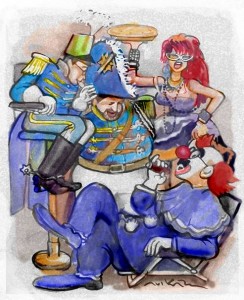
You may have heard that Mr. Babylon has, in his brief tenure, developed his own unique and sophisticated diplomatic tactics that have brought many ambassadors to their knees. But, President Firefly, you need not fear — as a seasoned and senior member of our country’s foreign service, I was prepared. I was determined to stand up to this baboon-faced flunky and defend the honor of Freedonia.
Train Tale”–Necessary Stories” column from The Jerusalem Report

It’s six thirty-five a.m. as I pull my bike into Jerusalem’s Malha train station. The sun is rising over the seam where the Pat neighborhood’s low, long public housing projects abut the houses of Beit Safafa. A handful of inchoate off-white clouds float through the air like empyrean amoebas, seeking to grab unwary prey in fluffy pseudopods. I lock my bike at the rack and take the escalator up to the station two steps at a time. The security guard, usually stationed downstairs, has set up her table at the top today, to escape the chill. She’s padded in a thick parka, but I’m warmed up from my bike ride and raring to get on the train. I’ve got work to do.
The train ride from Jerusalem to Tel Aviv takes an agonizing 80 minutes—agonizing if you are in a hurry to get to a meeting or if you are one of those high-powered high-tech guys who get apoplectic when they discover that there’s no cell phone reception for half that time. But if you are on your way to visit your mother-in-law, as I am, it’s heaven.
And I don’t mean that longer is better when the trip is to my mother-in-law’s apartment. We get along just fine. What I mean is that in the two hours and forty minutes that I will spend on the train today, to Tel Aviv and back, I’ll get nearly an entire day’s work done. The cars are comfortable, roomy, and quiet. They’re equipped with tables to put your laptop on and sockets to plug it into. There’s no Internet to tempt me and none of the distracting paperwork that sits on my desk in my office at home. It’s just me and the book I’m translating, and there’s nothing a translator needs more than a place he can focus. And in this modern age, such places are few and far between.
Marking it Up–Sami Berdugo’s “A Competition” in English
Every translator’s been there (and I was, just this week). A client says he showed your work to someone else, who proceeded to mark it up with improvements. The client deduces that you gave him a bad translation. Go convince him that there can be two good translations of a single text.
The final product will differ depending on a range of strategic and practical choices that every text forces a translator to make.
“No one can tell [the translator] how Homer affected the Greeks, but there are those who can tell him how Homer affects them,” wrote Matthew Arnold, decrying some of his contemporary translators of the ancient Greek classics. Guernica has published “A Competition,” a short story by Sami Berdugo, giving me the opportunity to say something about how the story (published on-line in Hebrew by Ynet in two parts, here and here) affected me, and how Dan Ofri’s translation affected me, and how those two experiences differed.
Successful New York Debut!
Last monthafter Saturday morning services at Congregation Beth Elohim in Brooklyn, I stood up in Rabbi Andy Bachman’s spacious study. I wasn’t sure what to expect. Were the personal stories of life in Jerusalem and Israel-forged humor of my Necessary Stories presentation going to click with the 50 sophisticated New Yorkers I found before me?
I’m happy to say that it went splendidly. From the start, people laughed in the right places—the best indication that they were engaged and entertained. And when the audience started breaking up before I’d had a chance to present my final segment, it wasn’t because they were bored. They explained that the children’s activities being held in parallel were coming to an end and that they had to pick up their kids.
Kudos came later by e-mail: “Haim Watzman transports his audience both in time and place in an authentic, heartfelt and intellectually thought-provoking performance,” wrote Doris Traub. David Greenberg, to whom I owe thanks for helping arrange the appearance, gave me this blurb: ““Haim Watzman brings the Israeli experience to life in a way that a history book never can. He reminded me again why Israel means so much to me. Mr. Watzman’s program was at once funny, thought-provoking, wise and enjoyable.”
Rachel Goes for a Swim–“Necessary Stories” column from The Jerusalem Report
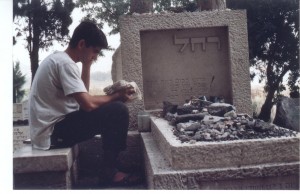
I’m trying to persuade Roni to join the fight to save the Jerusalem Pool. We’re standing in said pool’s scruffy, humid men’s locker room, suiting up. A few weeks before, the management had put up signs announcing that it would no longer renew annual memberships. The owners of the property, who also run the pool, wanted to demolish the pool and build three luxury apartment buildings.
“Just because you own a piece of property, it doesn’t mean you can do whatever you want with it,” I say.
What Would Brenner Say? — “Necessary Stories” column from The Jerusalem Report
“Write a short descriptive passage,” suggested the red-headed creative writing teacher who sat uncomfortably at the head of the table. We eight acolytes bent our heads submissively, pondered, and began to write.
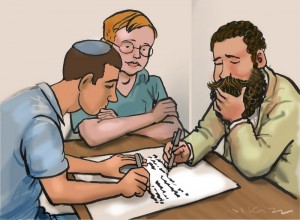
That didn’t seem to be a far-fetched goal at the time. I had a good command of my adopted language. I’d spent my first year in Israel in Hatzor Haglilit, a development town up north more forgotten and forsaken than Brigadoon – when visitors chanced on that mythical Scottish town once a century, they at least found it charming and were tempted to stay. Hatzor was a centrifugal village – whoever could get out left, and those that remained did so only because they were at the bottom of the bucket. There was little to do and nowhere to do it, nothing worth seeing and nowhere to see it, and only two inhabitants who spoke English. My ulpan Hebrew was quickly supplemented by street slang and underclass argot.
Beyond that, I forced myself to read Hebrew as much as I could. I refused to buy a newspaper in English (and in any case, The Jerusalem Report didn’t exist yet).
Rachel and Mt. Nevo–A Translation
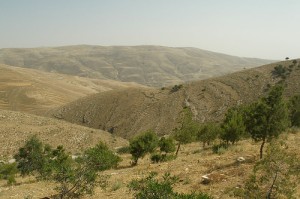
I told Rachel’s story in my book A Crack in the Earth. I noted there how Mt. Nevo was a central image in Rachel’s lyrics—and a central image for her readers as well. Nevo is the mountain from which Moses looked out over the Land of Israel, which he would never enter. In Rachel’s poetry, it’s the place from which the speaker looks out on an alternative life, the life longed or hoped for. The poetess stands in the wilderness and looks to the Promised Land.
Rachel as a Metaphor–Why Israeli Democracy is Just as Bad/Good as All Others
In politics, the pure is the enemy of the good. One need look no further than the discussion that ensued in response to my post Votes Are Not Enough. Some of the most prolific correspondents there, coming from both the right and left, shared the implicit assumption that democracy, if not pure, is not democracy.
Unfortunately, they won’t be able to read the fine essay that Nurit Gretz published in the arts and literature section of Friday’s Ha’aretz—the piece, in Hebrew, seems not to be available on-line. Gretz addresses a problem of the same genre and in doing so shows how wrong purism can be.
She does so by writing about one of the icons of Labor Zionism, A.D. Gordon, the Second Aliya’s guru of back-to-the-earth socialist egalitarianism. One of Gordon’s disciples was the poetess Rachel Bluwstein, who lived and worked at Kevutzat Kinneret on the southern edge of the Sea of Galilee, where Zionist farmers first tried to work on a communal basis. Bluwstein—universally known in Israel today as Rachel the Poetess—lived in accordance with Gordon’s teachings. She abandoned the middle-class life she’d known in Russia and set aside her aspirations for education and culture to become a simple farmer.
The Oration Vocation–“Necessary Stories” column from The Jerusalem Report
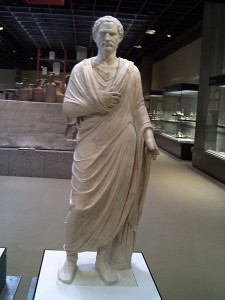 “I don’t like him already,” Leo Shocken barked to Inga, his svelte, silver-blonde assistant, who had just led me into his office. Large-jowled Shocken lounged behind a large desk strewn with files, calendars, and banana peels. He held a half-filled tumbler of bourbon in his hand and both his stocking feet were propped up on the desk. A thick cigar stood erect between his chomped teeth, pointing in the direction of a side wall festooned with the autographed photographs of the most famous Jewish synagogue speakers of our age.
“I don’t like him already,” Leo Shocken barked to Inga, his svelte, silver-blonde assistant, who had just led me into his office. Large-jowled Shocken lounged behind a large desk strewn with files, calendars, and banana peels. He held a half-filled tumbler of bourbon in his hand and both his stocking feet were propped up on the desk. A thick cigar stood erect between his chomped teeth, pointing in the direction of a side wall festooned with the autographed photographs of the most famous Jewish synagogue speakers of our age.
“Misteh Hocken, it’s Misteh Atzman,” she said, tottering on her super-high heels. There was a whiff of Transylvania in her accent. Or maybe it was Palo Alto. She hadn’t yet managed to pronounce enough complete words for me to tell.
“I don’t care who the hell it is,” Shocken growled, looking me straight in the eye. “What can he do?”
Inga swayed precariously. “He a eaker,” she volunteered.





